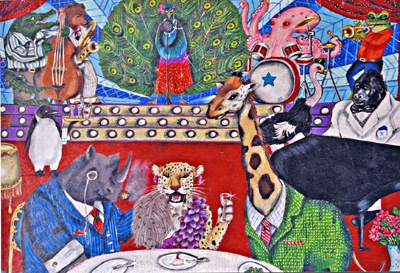All Nonfiction
- Bullying
- Books
- Academic
- Author Interviews
- Celebrity interviews
- College Articles
- College Essays
- Educator of the Year
- Heroes
- Interviews
- Memoir
- Personal Experience
- Sports
- Travel & Culture
All Opinions
- Bullying
- Current Events / Politics
- Discrimination
- Drugs / Alcohol / Smoking
- Entertainment / Celebrities
- Environment
- Love / Relationships
- Movies / Music / TV
- Pop Culture / Trends
- School / College
- Social Issues / Civics
- Spirituality / Religion
- Sports / Hobbies
All Hot Topics
- Bullying
- Community Service
- Environment
- Health
- Letters to the Editor
- Pride & Prejudice
- What Matters
- Back
Summer Guide
- Program Links
- Program Reviews
- Back
College Guide
- College Links
- College Reviews
- College Essays
- College Articles
- Back
The Legal Personhood Question
Legal Questions arising over the status of animals have increased in recent years. From documentaries like “Blackfish” which reported the dangerous abuses of killer whales at the SeaWorld theme parks to the Drama/Documentary “Unlocking the Cage” which followed the animal rights lawyer Steven Rice as he tried to get chimpanzees personhood and the ability to use Habeas Corpus.
The counterarguments to these suits have also presented themselves. While the SeaWorld Orcas are still in captivity, their breeding and entertainment programs have been ended but still, they remain enclosed. Steven Rice’s chimps, Kiko and Tommy still remain in captivity.
This has evidenced our legal system’s denial of animal rights and the continuing of tradition in treating our fellow animals in a subhuman way. Defamers of animal rights will continue to claim that animals have no legal body because they cannot understand the law, but animals should still have rights to a peaceful existence under it.
We cannot reasonably hold animals to the law, but we can at least give them the opportunity to be defended by attorneys against people who would wish to do them harm. This could possibly in the future amount to giving animals a limited personhood status.
We then must ask the question: What qualifications would these animals have to be considered persons?
If it is defined by intellectual terms it's obvious that animals like chimpanzees can match humans in cognitive abilities. Chimps have comparable speech equivalencies to humans and can memorize hundreds of words to learn sign language. Orca pods have been shown to have their own languages within their social groups. Chimpanzees have complex social structures as well organized in familial groups. Emotionally, both animals have been seen to exhibit grief and remorse. Emotionally and Intellectually they have us matched, but this doesn’t seem to sway lawmakers.
According to law, only a natural person or legal personality has rights, protections, privileges, responsibilities, and legal liability. On the surface, this argument can make sense. Chimps cannot be held accountable to the law for their crimes so it would be pointless to prosecute a chimp. Chimps cannot understand the law, so they shouldn’t serve on a jury. But this definition is also compromised. Human babies cannot understand the law nor be held accountable to it. This is why prosecutors did not sue a child who shot his mother with a gun that was concealed in her purse; This also is why babies are not expected to serve on a jury.
This is where some people introduce the concepts of emergence; Naysayers commit that personhood should be granted to those who have the nature to have human-like qualities emerge as they develop, which is why children constitute as persons under the law. But who is to say that Chimps do not fulfill these criteria as well? As aforementioned, chimps and orcas have incredible capabilities yet do not qualify as people, so headway has yet to be made on this front.
Legal Rights to animals don’t have to be granted all at once. Like pieces to a puzzle, more legislature will have to build slowly until their protections to amount to a person. But the more prosecutors fight on a case by case basis, the more ammunition they will have to challenge the larger issues that animals face legally.
Like Sandra the Ape who was granted non-human person status and has been transferred to a more preferable habitat. Or countries like Ecuador, India, New Zealand, and Bolivia who have granted certain environmental entities like rivers and forests protections against processes which would change their natural cycles.
Ultimately, our lawmakers will have to come to terms with their anthropocentric ideas to arbitrate whether these beings can live humanely.

Similar Articles
JOIN THE DISCUSSION
This article has 0 comments.

While this issue might not be widely known, it is still important to think about.